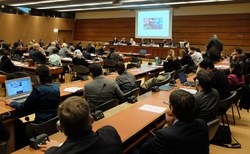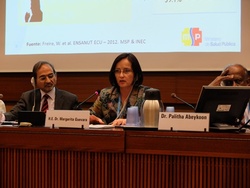World Health Assembly side event discusses alcohol marketing
Co-hosted by Botswana, Ecuador, Estonia, Sri Lanka and Vietnam a side event on "Alcohol Marketing in the Digital World" was held at the World Health Assembly in Geneva last week.
The side event focused on the proliferation of digital marketing of alcohol. Despite the international public health consensus about the concerns over alcohol marketing and the effectiveness of reducing the exposure, particularly of young people, there has been a considerable expansion of marketing activity in the digital world. Alcohol is a considerable public health burden resulting in some 3.3 million deaths annually and 4.1% of the health burden measured in Disability Adjusted Life Years (DALYs) and 6.6% for the age group 15-49 years.
 In her key note presentation Professor Sally Casswell, Director, WHO Collaborating Centre, Massey University, New Zealand and chair of the Global Alcohol Policy Alliance (GAPA) pointed out that there are three billion internet users in the world, with two billion active social media users. Though the numbers are lower in low and middle income countries this is an area with rapid expansion. Young adults who are the heaviest users of the internet and social media in particular are also the heaviest drinkers in many countries. Alcohol marketing is wide spread in many social media and entertainment channels, with both product advertisement and a blurring between company instigated and user generated content which, often portrays a culture of intoxication and widespread alcohol use. Research has shown a link between exposure to marketing material in the digital environment and early onset of drinking and heavier use. The transnational alcohol corporations are very active marketing brands in the global youth culture and are collaborating in many real world and digital events.
In her key note presentation Professor Sally Casswell, Director, WHO Collaborating Centre, Massey University, New Zealand and chair of the Global Alcohol Policy Alliance (GAPA) pointed out that there are three billion internet users in the world, with two billion active social media users. Though the numbers are lower in low and middle income countries this is an area with rapid expansion. Young adults who are the heaviest users of the internet and social media in particular are also the heaviest drinkers in many countries. Alcohol marketing is wide spread in many social media and entertainment channels, with both product advertisement and a blurring between company instigated and user generated content which, often portrays a culture of intoxication and widespread alcohol use. Research has shown a link between exposure to marketing material in the digital environment and early onset of drinking and heavier use. The transnational alcohol corporations are very active marketing brands in the global youth culture and are collaborating in many real world and digital events.
Following Professor Casswell's intervention representatives of the co-hosting member states held their interventions.
 H.E Margarita Guevara, Minister of Health, Ecuador pointed out that the pressure the industry is putting on is huge but that in Ecuador there is strong political will to address the problem. She presented several initiatives by the government to meet these challenges.
H.E Margarita Guevara, Minister of Health, Ecuador pointed out that the pressure the industry is putting on is huge but that in Ecuador there is strong political will to address the problem. She presented several initiatives by the government to meet these challenges.
Triinu Täht, Alcohol Policy National Counterpart, Ministry of Social Affairs, Estonia, showed various examples of digital alcohol marketing. She pointed out that it is not long since it was said that tobacco advertising could not be banned and said that an international response was required.
Dr. Nguyen Minh Hang - Deputy Director, General Department of Preventive Medicine, Ministry of Health, Vietnam, referred to the International Alcohol Control Study in her country which showed that alcohol advertising is reaching widely in all age groups including the age 16-17 and that Facebook is widely used by young people. She showed many examples of digital marketing including marketing of spirits on Facebook which is circumventing the law against advertising beverages above 13%.
Mr Phenyo Sebonego, the National Focal person for the Alcohol and Substance Abuse program, Botswana, showed data that indicates that the drinking age is getting lower. He informed that legislation of alcohol marketing is at the draft stage and he pointed to the need for cooperation between countries.
Dr. Palitha Abeykoon, Chairman, Tobacco and Alcohol Authority of Sri Lanka, presented the work that has been done in Sri Lanka where there is a comprehensive act regulating both tobacco and alcohol and where there is a ban on advertising of both products. He showed some examples of industry circumvention of the legislation.
Moderator Dr. Shekhar Saxena, Director, Department of Mental Health and Substance Abuse, World Health Organization summed up the presentations with the observation that the problems in relation to digital marketing of alcohol are common in the sense of frequent within all the countries participating and common in the sense of similar for all the involved Member States that presented from the panel. He thanked the sponsoring member states for organising this event and all the panel members and participants for their contribution.
In the interventions from the audience, it was pointed out that a long time has passed since the WHO Global strategy to reduce the harmful use of alcohol was endorsed in 2010, and that there is a need to revisit that. Several interventions referred to the experience with tobacco and would like to see something similar for tobacco. The FCTC Article 1 was particularly mentioned for definitions of advertising and sponsorship.
In the WHA debate on non-communicable diseases (NCDs) the next day several countries mentioned the need for stronger public health response to address the harmful use of alcohol.Congo, speaking on behalf of 47 countries in the African region, called on the Director General of WHO to set up a thinking group to look at harmful use of alcohol as a factor for NCDs. This was supported by Botswana speaker who called upon the Director General to study the necessity and feasibility of a legally binding instrument to strengthen the public health response to harmful use of alcohol. Also speaking on the matter, Thailand, Sri Lanka, South Africa and Senegal supported the need to address alcohol.

